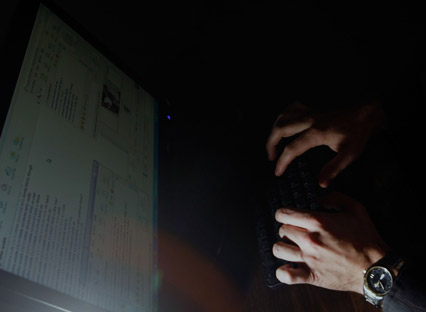Car hackers: vehicle security flaws are 'likely to kill someone'
Hackers discover software flaws that could let people take control of vehicles via the web

A free daily email with the biggest news stories of the day – and the best features from TheWeek.com
You are now subscribed
Your newsletter sign-up was successful
Car hackers in the US have demonstrated their ability to take control of a vehicle, including its brakes, steering, engine, radio and air conditioning and said that they will publish a how-to guide on the internet next month.
The hackers, Charlie Miller and Chris Valasek, proved that they could take control of core functions of a Jeep Cherokee to Wired journalist Andy Greenberg.
In the test, the hackers disabled the journalist's accelerator as he drove along a highway, nearly causing an accident with an articulated lorry.
The Week
Escape your echo chamber. Get the facts behind the news, plus analysis from multiple perspectives.

Sign up for The Week's Free Newsletters
From our morning news briefing to a weekly Good News Newsletter, get the best of The Week delivered directly to your inbox.
From our morning news briefing to a weekly Good News Newsletter, get the best of The Week delivered directly to your inbox.
The hackers also demonstrated their ability to remotely control the car's entertainment system, blaring hip hop at full volume, and its climate control system, by blasting cold air into the cabin. They also cut the Jeep's brakes, causing the journalist to careen into a ditch.
Miller and Valasek's hacks on the Jeep were designed to show the flaws in Chrysler's Uconnect internet-connected computer feature, which is installed in hundreds of thousands of Fiat Chrysler cars, trucks and SUVs around the world.
"From an attacker's perspective, it's a super nice vulnerability," Miller says.
Miller and Valasek have been working with Chrysler for months to help the company improve its systems, but have now gone public with the hack and say that they will release part of the code at the Black Hat security conference in Las Vegas next month.
A free daily email with the biggest news stories of the day – and the best features from TheWeek.com
In a statement, Chrysler criticised the decision, saying: "We appreciate the contributions of cyber security advocates to augment the industry's understanding of potential vulnerabilities. However, we caution advocates that in the pursuit of improved public safety they [do] not, in fact, compromise public safety."
The hackers responded that their information release is warranted because it allows their techniques to be tested through peer review.
The publication also "sends a message", Wired says. "Automakers need to be held accountable for their vehicles' digital security."
Miller points out: "If consumers don't realise this is an issue, they should, and they should start complaining to carmakers. This might be the kind of software bug most likely to kill someone."
According to Wired, legislation designed to protect drivers and their passengers from hackers may well follow. US senators Ed Markey and Richard Blumenthal intend to introduce a security bill to set new digital security standards for both cars and trucks.
-
 Tourangelle-style pork with prunes recipe
Tourangelle-style pork with prunes recipeThe Week Recommends This traditional, rustic dish is a French classic
-
 The Epstein files: glimpses of a deeply disturbing world
The Epstein files: glimpses of a deeply disturbing worldIn the Spotlight Trove of released documents paint a picture of depravity and privilege in which men hold the cards, and women are powerless or peripheral
-
 Jeff Bezos: cutting the legs off The Washington Post
Jeff Bezos: cutting the legs off The Washington PostIn the Spotlight A stalwart of American journalism is a shadow of itself after swingeing cuts by its billionaire owner
-
 Why Britain is struggling to stop the ransomware cyberattacks
Why Britain is struggling to stop the ransomware cyberattacksThe Explainer New business models have greatly lowered barriers to entry for criminal hackers
-
 Who are the new-wave hackers bringing the world to a halt?
Who are the new-wave hackers bringing the world to a halt?The Explainer Individual groups and nations are beginning to form concerning partnerships with new ways to commit cybercrime
-
 Jaguar Land Rover’s cyber bailout
Jaguar Land Rover’s cyber bailoutTalking Point Should the government do more to protect business from the ‘cyber shockwave’?
-
 Airplane crash-detection systems could be vulnerable to hackers
Airplane crash-detection systems could be vulnerable to hackersUnder the Radar 'The idea scares the shit out of me,' one pilot said
-
 Elon Musk's DOGE website has gotten off to a bad start
Elon Musk's DOGE website has gotten off to a bad startIn the Spotlight The site was reportedly able to be edited by anyone when it first came online
-
 The Internet Archive is under attack
The Internet Archive is under attackUnder the Radar The non-profit behind open access digital library was hit with both a data breach and a stream of DDoS attacks in one week
-
 How cybercriminals are hacking into the heart of the US economy
How cybercriminals are hacking into the heart of the US economySpeed Read Ransomware attacks have become a global epidemic, with more than $18.6bn paid in ransoms in 2020
-
 Language-learning apps speak the right lingo for UK subscribers
Language-learning apps speak the right lingo for UK subscribersSpeed Read Locked-down Brits turn to online lessons as a new hobby and way to upskill